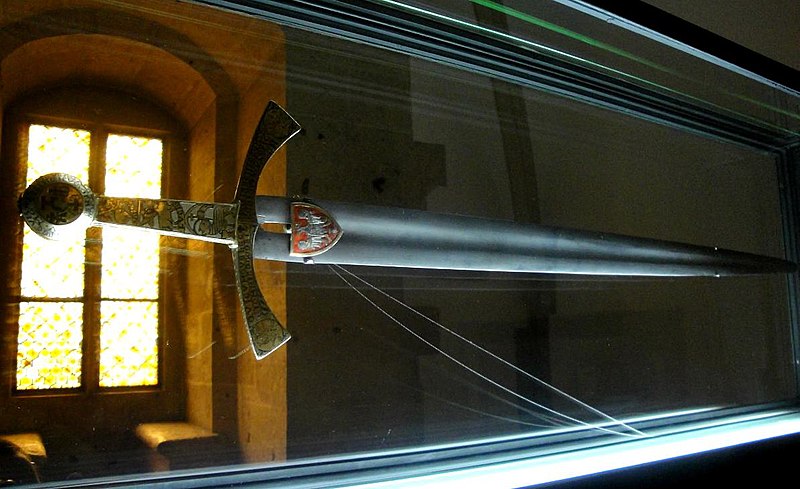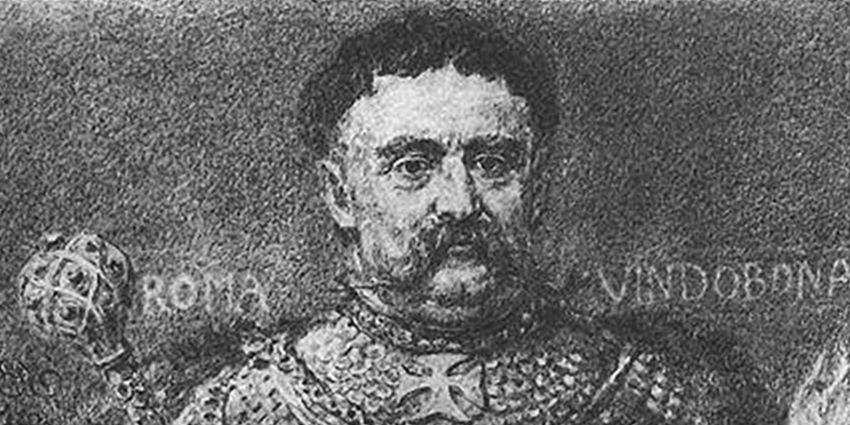What I know (!), I would be first in the world that ever went public with this idea. My contribution to Polish history. From Srbin to Szczerbin. Mistake is possible in my interpretation of name `Szczerbiec` but, I sense something in this. Its just so logical to me, having in mind logic of Balkan and Lusatian Serbs in ethnic naming.
So, was name of Szczerbin first and original Polish ethnic name, local version of Sarmatian name, back in past universal name of all Slavs?
Polish Szczerbiec sword must be in connection to Polish Sarmatian origin. After all, Polish legends do confirms Polish Sarmatian origin. So, only open question is the local `Polish speaking area` original version of Sarmatian name.
Szczerbiec
en.wikipedia.org/wiki/Szczerbiec

Szczerbiec on display in the Wawel Castle treasure vault
Why name of Szczerbiec to the sword? It was the coronation sword that was used in crowning ceremonies of most Polish monarchs from 1320 to 1764. Obviously, originally, Warlords of Sarmatian tribe of Polani that dominated the region, when sought to unite land turned to ancestral symbolism- to the local version of once universal name of all Slavs- to Sarmatian name. They turned to meta-ethnicity of its people, to its ultimate Sarmatian identity.
I don`t know did you Poles noticed that but, name of sword Szczerbiec must be best link that Poles needs to use in search for their own version of Sarmatian name. See, we Serbians on Balkan/CE preserved that name in form SRBI, SRBIJANCI I SRPSKO. Lusatian CE Serbs would say SERBJA, SERBY and SRBSKO. Also, have in mind that linguistic and history connects Czechs to name BOII (Boika, Serboi > Ser-boii), so comes the Bohemia. As you know `Sarmatian` is foreign given form in accordance with linguistics of foreigners and modern science suggests that Sarmatian name was universal name of all Slavs in past.
Poles, your most probable original ethnic name was Szczerbi. You are SZCZERBI. There comes the Szczerbiec sword.
SZCZERBI. Those are you Poles. Polani were just segment of wider picture. They were part of vast and venerable Sarmatian realm.
God bless you all, Sarmats (ie Slavs), my sisters and brothers!
And awake, just awake!
So, was name of Szczerbin first and original Polish ethnic name, local version of Sarmatian name, back in past universal name of all Slavs?
Polish Szczerbiec sword must be in connection to Polish Sarmatian origin. After all, Polish legends do confirms Polish Sarmatian origin. So, only open question is the local `Polish speaking area` original version of Sarmatian name.
Szczerbiec
en.wikipedia.org/wiki/Szczerbiec

Szczerbiec on display in the Wawel Castle treasure vault
Why name of Szczerbiec to the sword? It was the coronation sword that was used in crowning ceremonies of most Polish monarchs from 1320 to 1764. Obviously, originally, Warlords of Sarmatian tribe of Polani that dominated the region, when sought to unite land turned to ancestral symbolism- to the local version of once universal name of all Slavs- to Sarmatian name. They turned to meta-ethnicity of its people, to its ultimate Sarmatian identity.
I don`t know did you Poles noticed that but, name of sword Szczerbiec must be best link that Poles needs to use in search for their own version of Sarmatian name. See, we Serbians on Balkan/CE preserved that name in form SRBI, SRBIJANCI I SRPSKO. Lusatian CE Serbs would say SERBJA, SERBY and SRBSKO. Also, have in mind that linguistic and history connects Czechs to name BOII (Boika, Serboi > Ser-boii), so comes the Bohemia. As you know `Sarmatian` is foreign given form in accordance with linguistics of foreigners and modern science suggests that Sarmatian name was universal name of all Slavs in past.
Poles, your most probable original ethnic name was Szczerbi. You are SZCZERBI. There comes the Szczerbiec sword.
SZCZERBI. Those are you Poles. Polani were just segment of wider picture. They were part of vast and venerable Sarmatian realm.
God bless you all, Sarmats (ie Slavs), my sisters and brothers!
And awake, just awake!





